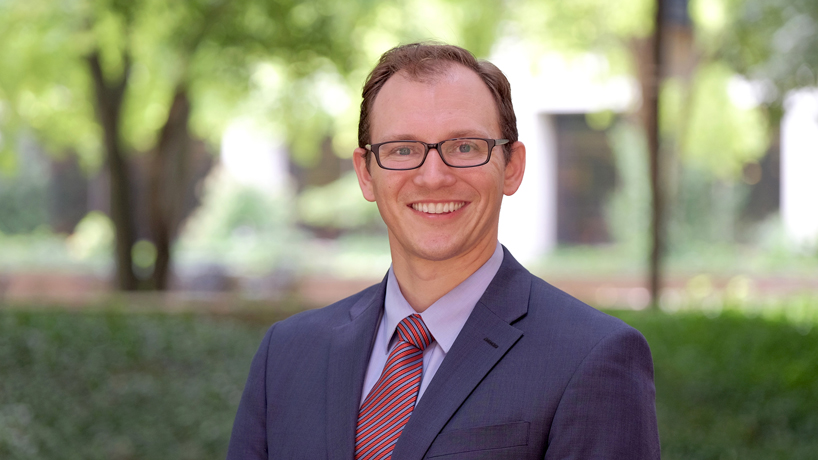
Being intentional about recruiting and hiring diverse candidates and supporting their career development is an important step every organization can take to improve inequality in the St. Louis region. (Photo by August Jennewein)
Racial and economic inequality and segregation have been built into the fabric of St. Louis and many other American cities for decades.
They were born out of structural forces and policy choices made over centuries.
There has been increasing acknowledgment of that reality in recent years, but it isn’t easy to unwind that history and its continued impact on today.
Karl Guenther serves as UMSL’s assistant vice chancellor of economic and community development. (Photo by August Jennewein)
“Organizations have many ways they shape connections to economic opportunity,” said Karl Guenther, the assistant vice chancellor of economic and community development at the University of Missouri–St. Louis. “Are we building companies and institutions that really work for folks coming from low-income backgrounds or Black and brown residents and business owners in our region?
“We need to be intentional about that work if we’re going to be part of addressing those racial, economic and spatial inequities in our region.”
It can begin with each organization taking a hard look at their own hiring and purchasing processes, working with local vendors and making sure they’re providing opportunity to a diverse pool of applicants.
Improving recruitment, hiring and career development
Business leaders should be thoughtful about where and how they’re recruiting to their companies, taking care not to overlook talented candidates because they don’t come from a particular background.
Similarly, every job posting includes a list of required qualifications, but not all of them are necessary for someone to be able to do the job.
“We need to be more intentional around creating different kinds of on-ramps for people to land a job,” Guenther said. “Putting more of a focus on the skills of candidates and then supporting their development and growth at institutions.”
It’s also estimated that more than one in four adults in the United States have a criminal record, according to 2016 data from the Bureau of Justice Statistics. That can act as a barrier for obtaining gainful employment, even if their offenses were decades old or relatively minor in nature. Keeping these individuals out of the workforce can not only keep them from economic opportunity but also can impact their families and communities.
Recruiting and hiring are only a first step. Businesses should also build career paths and professional development that support people in entry level and mid-career positions to rise at the company. Businesses can make an impact on racial and economic inequality by hiring and supporting the growth of low-income people and people of color into sustainable higher wage employment.
Broaden the base of organizations with whom you do business
As with landing a job, landing a contract can often come down to who someone knows. Networking and transparency play a big part in how people learn of opportunities, and the right connections can make one bidder stand out from the rest.
The same can be true for general purchasing.
There might be good reasons why a business continually chooses the same T-shirt supplier, hires the same communications consultant or works with the same contractors to tuck-point their buildings or wire their computer labs, including already established trust in a particular vendor.
But it can lead to inefficiency and also deny opportunity to smaller or lesser-known businesses.
Companies need to go further to ensure diversity of bids while considering ways they might be creating barriers for businesses.
“Are we able to break up contracts so that there’s more of a ladder of opportunity from small to mid to large contracts versus just having small contracts and then really large contracts?” Guenther said. “Are we requiring insurance levels that are not appropriate to the risk level of the project? How much lead time do we give before projects go for bid so that smaller companies and midsize companies have time to put their best foot forward at securing business? Do we pay small businesses quickly enough to not hurt their companies? How are we partnering with business development organizations to foster a supportive environment for businesses that want to work with larger institutions and companies in St. Louis?”
These are all questions companies should have incentive to explore.
Change won’t happen on its own
To fully address the problem of racial and economic inequality in the St. Louis region will require individual and collective action across governments, nonprofits, businesses and residents to facilitate investment and unlock opportunity in underinvested communities.
Individual organizations can start by evaluating their practices, challenge themselves to do their part through improving their own actions, and commit to track and measure progress in building more equitable companies and communities.
Guenther believes it will help if organizations – including the University of Missouri–St. Louis – set an example for others to follow.
“We have to walk the walk and show that things are possible,” he said.
As more institutions and companies of all types show demonstrable change addressing internal shortcomings and working to increase investment with low-income and Black and brown residents and businesses, they’ll give other organizations a model from which to learn, and these practices will continue to spread throughout the region.
Learn more about the UMSL Anchor Institution Initiative to build a stronger North County and St. Louis region at https://www.umsl.edu/collaborations/anchor-folder/index.html.
This story originally appeared in the St. Louis Business Journal’s Rise Up for St. Louis content hub, sponsored by the University of Missouri–St. Louis.















